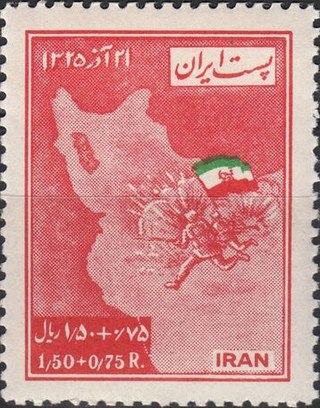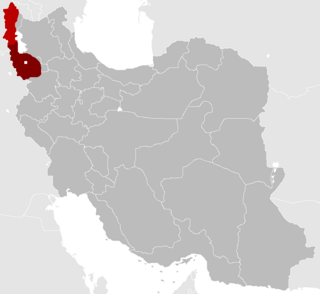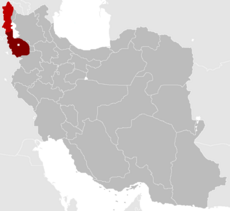
The United Nations Security Council (UNSC) is one of the six principal organs of the United Nations (UN) and is charged with ensuring international peace and security, recommending the admission of new UN members to the General Assembly, and approving any changes to the UN Charter. Its powers as outlined in the United Nations Charter include establishing peacekeeping operations, enacting international sanctions, and authorizing military action. The UNSC is the only UN body with authority to issue resolutions that are binding on member states.

The member states of the United Nations comprise 193 sovereign states. The United Nations (UN) is the world's largest intergovernmental organization. All members have equal representation in the UN General Assembly.

The United Nations Security Council veto power is the power of the five permanent members of the UN Security Council to veto any decision other than a "procedural" decision.

The Iran crisis of 1946, also known as the Azerbaijan crisis in Iranian sources, was one of the first crises of the Cold War, sparked by the refusal of Joseph Stalin's Soviet Union to relinquish occupied Iranian territory despite repeated assurances. The end of World War II should have resulted in the end of the Allied joint occupation of Iran. Instead, pro-Soviet Iranians proclaimed the separatist Azerbaijan People's Government and the Kurdish separatist Republic of Mahabad. The United States pressure on the Soviet Union to withdraw is the earliest evidence of success with the new strategy of Truman Doctrine and containment.
The United Kingdom is a founding member of the United Nations and one of five permanent members of the UN Security Council.

United Nations Security Council Resolution 2 was adopted unanimously on 30 January 1946. The Council urged Iran and the Soviet Union to resolve the crisis caused by the Soviet occupation of Iranian territory.

United Nations Security Council Resolution 3 was adopted on 4 April 1946. The Council acknowledged that Soviet troops occupying Iran were not removed in accordance with the Tri-partite Treaty of 29 January. Further proceedings surrounding the Iranian crisis were deferred until 6 May, when Soviet withdrawal was to be complete.

United Nations Security Council Resolution 4 was adopted on 29 April 1946. The Council condemned Francoist Spain and formed a sub-committee to assess the conflict in the country.

United Nations Security Council Resolution 85, adopted on July 31, 1950, was the United Nations Security Council resolution which authorized the United Nations Command to support the Korean civilian population, and requested that specialized agencies, appropriate subsidiary bodies of the UN and appropriate non-governmental organizations support the UN Command in doing so. It was adopted at the 479th meeting after United Nations Security Council Resolution 84 was passed creating the unified command.

United Nations Security Council Resolution 34, titled "The Greek Question" and adopted on 15 September 1947, removed disputes between Greece and Albania, Yugoslavia and Bulgaria from the Council's agenda. It further requested the Secretary-General to place all records and documents in the case at the disposal of the General Assembly.

United Nations Security Council Resolution 38, adopted on 17 January 1948, called upon the governments of the new dominions of India and Pakistan to refrain from in any way aggravating the situation in Kashmir and to deploy any means at their disposal to improve it. It further requested that both governments inform the Security Council of any material changes in the situation while it remained under the Council's consideration.
United Nations Security Council Resolution 41, adopted on February 28, 1948, commended both parties in the Indonesian National Revolution for the recent signing of a truce and attempts to comply with United Nations Security Council Resolution 27, repeated the offer of mediation made in United Nations Security Council Resolution 31, and requested the Committee of Good Offices keep them informed as to the progress of political settlement in the Indonesia.

United Nations Security Council Resolution 48, adopted on April 23, 1948, called on all concerned parties to comply with United Nations Security Council Resolution 46 and to that end established a Truce Commission for Palestine to assist the Security Council in implementing the truce.

United Nations Security Council Resolution 53, adopted on 7 July 1948, took into consideration a telegram from the United Nations Mediator in Palestine dated 5 July 1948. The resolution "addresses an urgent appeal to the interested parties to accept in principle the prolongation of the truce for such period as may be decided upon in consultation with the Mediator."

United Nations Security Council Resolution 66, adopted on December 29, 1948, in response to a report by the Acting Mediator regarding hostilities which broke out in southern Palestine on December 22 despite UN calls for a cease-fire, the Council demanded the immediate implementation of United Nations Security Council Resolution 61. The Resolution instructs the Acting Mediator to facilitate the complete supervision of the truce by the UN observers. The Resolution further instructs the committee appointed in UNSC Resolution 61 to meet at Lake Success, New York on January 7 to consider the situation in southern Palestine and to report to the Council on the extent to which governments have or have not complied with UNSC Resolutions 61 and 62. The Resolution also invited Cuba and Norway to replace the two retiring member of the committee on January 1.

United Nations Security Council Resolution 1696, adopted on July 31, 2006, after expressing concern at the intentions of the nuclear programme of Iran, the Council demanded that Iran halt its uranium enrichment programme.

United Nations Security Council Resolution 83, adopted on June 27, 1950, determined that the attack on the Republic of Korea by forces from North Korea constituted a breach of the peace. The Council called for an immediate cessation of hostilities and for the authorities in North Korea to withdraw their armed forces to the 38th parallel. They also noted the report by the United Nations Commission on Korea that stated North Korea's failure to comply with Security Council Resolution 82 and that urgent military measures were required to restore international peace and security.

United Nations Security Council resolution 461, adopted on 31 December 1979, after recalling its Resolution 457 (1979), the council noted the increasing tension between Iran and the United States and condemned Iran for continuing to hold American hostages at the U.S. embassy in Tehran. The council also cited the International Court of Justice order to immediately release the hostages without any exceptions.














